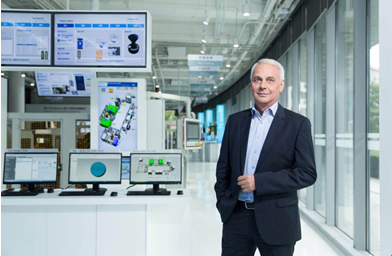Siemens: Unleashing the power of digitalization with Chinese customers Release date:2018-09-28
Today’s guest:
Lothar Herrmann, CEO of Siemens Greater China

As one of the forerunners and important builders of the Industry 4.0, Siemens is leading in the process of enterprise digitalization. At the first China International Import Expo to be held in Shanghai on November 5, Siemens will show its leading technologies, comprehensive solutions and strong project strength in electrification, automation, and especially digitalization. The exhibition will cover many areas such as energy transformation, digital manufacturing, digital cities and the “Belt & Road” Initiative, which are of practical significance for China to further strengthen its international cooperation in the future.
Q: As one of the initiators of Industry 4.0, what kind of cooperation has Siemens had with Chinese enterprises in the field of digitalization in recent years?
A: Digitalization is reshaping every industry with its great transformative power. Already we have seen tremendous changes in the consumer market. For those who set and embrace this trend, digitalization contains opportunities.
Almost every day, we can see manufacture industry shifting from mass production to customized production, from competing in price wars and over quantity to focusing on quality and innovation. For them, the speed and scale of both transformation and upgrading are the key to leading and succeeding in the digital age.
In China, the golden time for digital enterprises is now! Today, digitization is the most effective means to achieve growth, improve competitiveness and create a better life. I know that many Chinese companies have placed digitalization at the core of their strategy. However, digitalization will not happen overnight. Therefore, we hope to unleash the power of digitalization with our Chinese customers through mutually beneficial cooperation.
In the first half of this year, Siemens worked with many Chinese companies, providing them with solutions for digital upgrades. In July, Siemens signed a series of cooperation agreements with a number of Chinese enterprises in Berlin during Premier Li Keqiang’s visit to Germany.
Q: Over the past several years, Siemens has established research centers in Chengdu, Qingdao and Suzhou in China. What was the purpose for this?
A: After 40 years of reform and opening up, China has entered a new era. China is carrying out a structural adjustment of its economy, focusing on high-quality development driven by innovation. In my opinion, digital transformation will have a far-reaching impact on China’s economic development, and China needs to rely on digitally oriented innovation to achieve its industrial upgrades.
Therefore, in 2016, Siemens launched the Siemens China Innovation Center Initiative, focusing on innovation in the area of digitalization. Under this initiative, the Siemens Qingdao Innovation Center was set up in March 2016. This was Siemens’ first innovation center for intelligent manufacturing outside of Germany. In September 2016, Siemens Corporate Technology Suzhou opened with a focus on technological innovation, development and applications in fields such as industrial big data, industrial Internet of Things, connected mobility, industrial cyber security and industrial robotics.
In August 2017, Siemens joined hands with the Chengdu Hi-tech Industrial Development Zone to establish the Siemens Intelligent Manufacturing (Chengdu) Innovation Center and the Siemens China Software Development (Chengdu) Center, the company’s first MindSphere-focused R&D Center in China. The cooperation is set to provide the most advanced and integrated digital enterprise solutions to manufacturers in the region, so as to enable them to realize digitalization.
Over the years, China has become one of Siemens' largest R&D bases in the world. We innovate actively in China and develop the most promising products and solutions for this country as well as the rest of the world.
Currently, the company has 21 R&D centers and more than 4,500 R&D and engineering staff in China. The staff are working in world-class innovation labs in Beijing, Shanghai, Suzhou, Nanjing, Wuhan, Wuxi, Qingdao, Chengdu, etc. so as to contribute to China’s indigenous innovation.
Meanwhile, Siemens China is leading the company’s global research in autonomous robotics with a focus on the research and development of new mechatronics systems, human-robot collaboration and the applications of artificial intelligence in robotic controllers.
Q: Standing at this new historical starting point of the 40th anniversary of China’s reform and opening up, China will further expand its degree of openness. What expectations does Siemens have for the future development of the Chinese market?
A: Over the past 40 years of China’s reform and opening up, the country has grown from one that was hurrying along to catch up with its advanced peers, to a member of the global community, and then to an important power leading the world economy. Meanwhile, multinational enterprises in China have been a part of the process all along, starting from testing the waters in the Chinese market, to cooperating with local businesses, and to integrating into Chinese society.
China has also indicated its commitment to further opening up its market under the new globalization backdrop. It is showing an increasing willingness to follow its reforms to the end and to always keep its doors open to the outside. We believe that the international community will continue to support and participate in China’s reform and opening up.
Siemens has been present in China for more than 145 years since 1872. As a foreign-funded enterprise that set up a holding company in China early after the reform and opening up, Siemens has, with its own advanced technology, products and solutions, shaped this glorious period of history of pursuing excellence together with the Chinese people and, as a result, obtained historic opportunities from it. At present, Siemens has 34,000 employees in China with business all over the country.
Today, China is still an important market for Siemens. We will continue to invest in digitalization, innovation and the training of talent so that our customers and partners, society and the company itself can all benefit simultaneously.